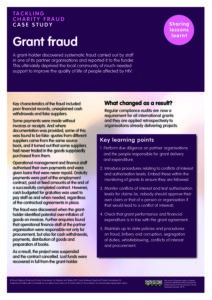Grant fraud (example 1)
A grant-holder discovered systematic fraud carried out by staff in one of its partner organisations and reported it to the funder. This ultimately deprived the local community of much-needed support to improve the quality of life of people affected by HIV.
Key characteristics of the fraud included poor financial records, unexplained cash withdrawals and fake suppliers.
Some payments were made without invoices or receipts. And where documentation was provided, some of this was found to be fake: quotes from different suppliers came from the same source book, and it turned out that some suppliers had never traded in the goods supposedly purchased from them.
Operational management and finance staff authorised their own payments and were given loans that were never repaid. Gratuity payments were part of the employment contract, paid at fixed amounts at the end of a successfully completed contract. However, cash budgeted for gratuities was used to pay staff as and when needed, regardless of the contractual agreements in place.
The fraud was discovered when the grant-holder identified potential over-inflation of goods on invoices. Further enquiries found that operational finance staff at the partner organisation were responsible not only for procurement, but also for cash withdrawals, payments, distribution of goods and preparation of books.
As a result, the project was suspended and the contract cancelled. Lost funds were recovered in full from the grant-holder.
What changed as a result?
Regular compliance audits are now a requirement for all international grants and they are applied retrospectively to organisations already delivering projects.
Key learning points
- Perform due diligence on partner organisations and the people responsible for grant delivery and expenditure.
- Introduce procedures relating to conflicts of interest and authorisation levels. Embed these within the monitoring of grants to ensure they are followed.
- Monitor conflicts of interest and test authorisation levels for claims (ie, nobody should approve their own claim or that of a person or organisation if that would
lead to a conflict of interest). - Check that grant performance and financial expenditure is in line with the grant agreement.
- Maintain up-to-date policies and procedures on fraud, bribery and corruption, segregation of duties, whistleblowing, conflicts of interest and procurement.
Download
Category Case studies
